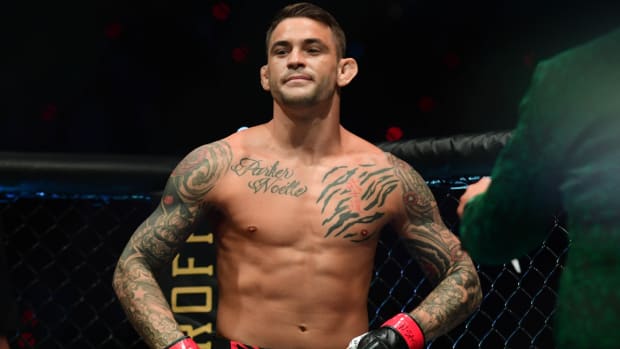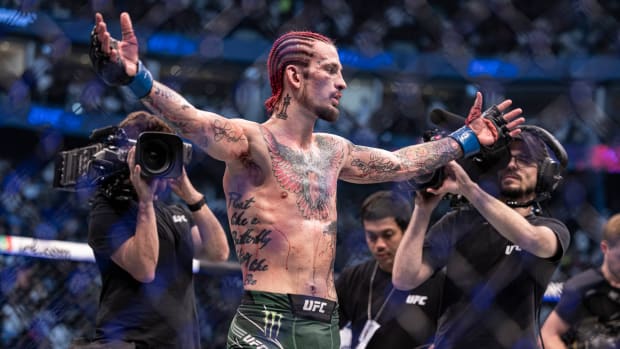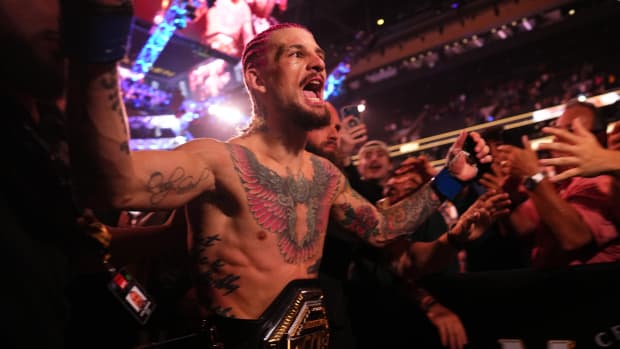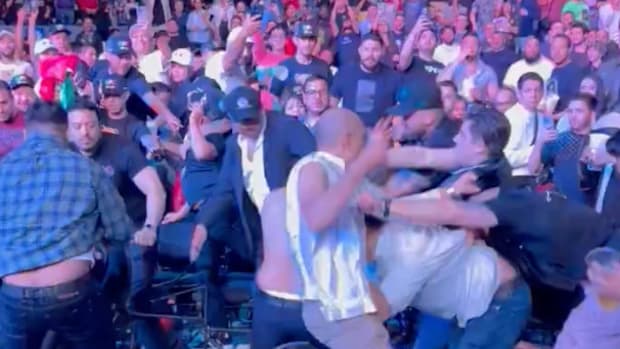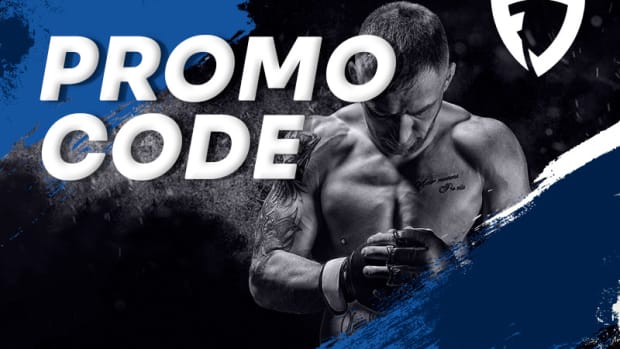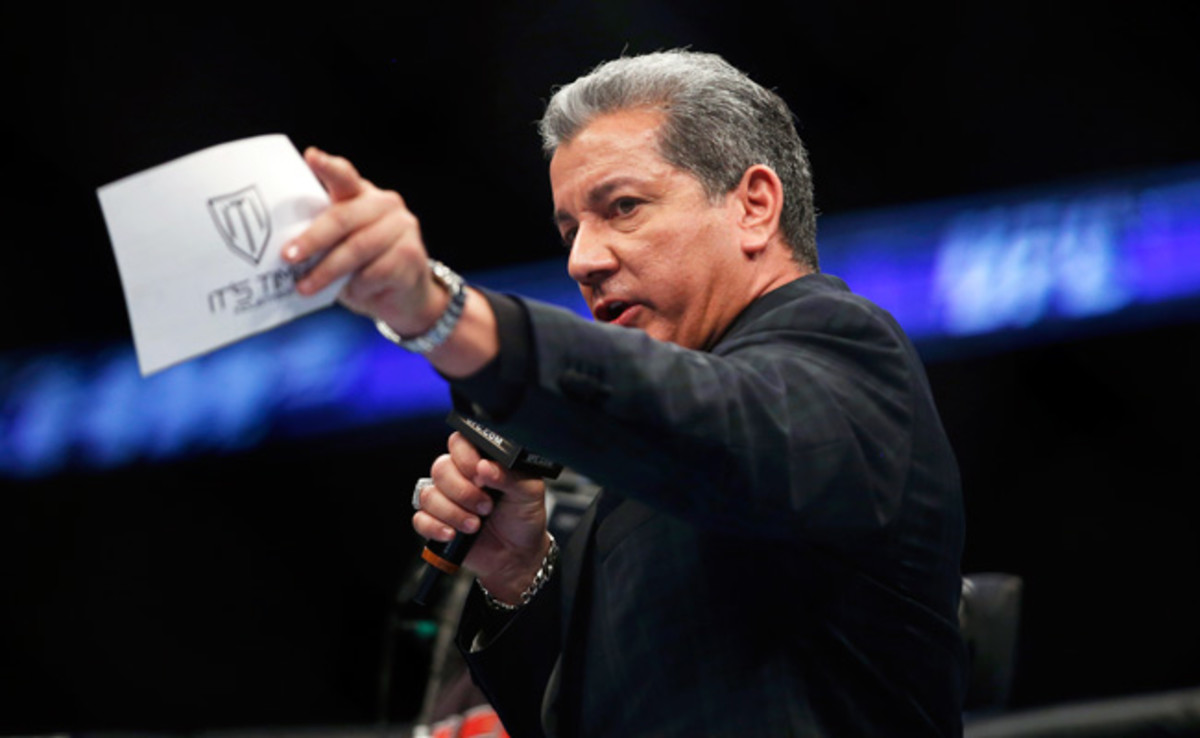
UFC announcer Bruce Buffer looks back after 17 years in the octagon

Bruce Buffer did not know he was the half-brother of boxing announcer Michael Buffer until he was 30.
/AP
The first time I saw Bruce Buffer introducing UFC fighters, more than 15 years ago, my mind flashed to Marv Albert. I remembered that I'd read or heard a story about the eminent basketball play-by-play man as a kid in Brooklyn, and how he and his brothers Al and Steve, both of whom also grew up to be sports announcers, would sit around their living room pretending to call games. That's exactly what one would expect from a family of little boys with big dreams.
So as I watched Bruce bellow out names and fight records inside the cage, I wondered if a similar childhood scene had played out in the Buffer household. I imagined Bruce and Michael Buffer, the iconic boxing ring announcer of "Let's get ready to rumble!" fame, taking turns giving a family pet or the standup vacuum cleaner in the corner a gala introduction.
It turns out, though, that there was no such living room arena, at least not one that the two boys shared. Bruce and Michael did not grow up together. In fact, it wasn't until Bruce was 30 and Michael in his 40s that they learned they were half-brothers, both offspring of the father who raised Bruce and whom Michael did not know. The family reunion came about because Bruce, a lifelong boxing fan whose grandfather -- and Michael's, too -- was the bantamweight world champion Johnny Buff, got to wondering about the man with his last name who was introducing the fights he liked to watch on TV.
"I used to get butterflies in my stomach every time I saw his name flash on the TV screen," said Bruce. "It just didn't make sense to me. I'd seen just about every phone book in the country, from working in telemarketing, and had often looked up my last name. You didn't see the last name 'Buffer' every day. "
Bruce mentioned his curiosity to his father during a car ride, "and it was a good thing he was the one driving, instead of me, when he told me what he told me," said Buffer. "I had no idea he'd been married before marrying my mom, much less that he'd had a child. I was, like, 'What are you talking about?' I mean, I'm not 12, I'm not 8, I'm not 2, I'm 30, and I've already got my life going on a path. Where do we go from here?"
Buffer weaves the story of that rerouted path in his new autobiography, It's Time: My 360 Degree View of the UFC (Crown Publishing). How he tracked down Michael at an arena where he was working a boxing card, and got him on the phone with their dad that very night. How the brothers became friendly, and Michael eventually entrusted Bruce, who'd built lucrative telemarketing companies, with managing his career and helping him trademark his famous catchphrase, "Let's get ready to rumble." How Bruce followed his brother into the UFC octagon, where Michael had announced a couple of fight cards. How Bruce has grown with the behemoth mixed martial arts promotion and become an icon himself, a jumping, spinning, in-your-face voice of the octagon.
Buffer sat down with SI.com to talk about family and fighters, and the passion that connects them.
SI.com:How much of an influence was Michael on you wanting to be that guy in the center of the cage? Had you considered that career path before meeting your brother, or did your interest grow out of watching him?
Buffer: I had always enjoyed being onstage. As a young kid, I wanted to enter show business. I studied acting. But I gave up that dream. When I was 18, I started in the sales world, and I had my first company by the time I was 19. I ended up with a lot of actors and actresses working for me, making money while they were trying to get their careers together. I saw the passion they had, and could relate to it, but I also would see them come into work after an audition saying, "I got it, I got it," and then later, "Oh, no, I didn't get it." I saw how ruined they would get. Pounding pavement for auditions is a tough go. I was more interested in knocking down the doors of the world, business-wise. I wanted to get out there and conquer.
SI.com:But the dream never really went away for you, did it?
Buffer: No, it really didn't. After I gave up on the acting world, I fulfilled that part of myself by doing motivational speaking. I've always loved being in front of groups. I love being, shall we say, onstage. So when I first watched Michael in a boxing ring, I thought, "What a cool job." He was traveling the world, dressing up in a tux and bringing excitement to an event. I was fascinated by what he was doing, and could see myself doing that. I didn't know back then that I would really pursue it. But did I think about it? Yeah.
SI.com:You and Michael are very different in the way you approach the job, very different sounding. Is that simply a matter of you two being naturally different, or did you intentionally create a style that would distinguish yourself from your brother?
Buffer: It's a combination of both, but more something natural. My natural style is to work from a point of passion. The show is not about me, but my job is to go out there and give 100 percent of my lungs, my passion, to these great warriors I'm introducing in the octagon. They've been training for eight to 10 weeks to step into this cage and fulfill their dream, and I'm there to get the fans excited beyond the level of excitement that's already been established.
I've never been interested in copying Michael. His style is legendary. He's an icon. I think he's the greatest announcer in the history of sports. I wanted to have my own style. A writer named Frank Curreri said in an article that Michael is like a fine bottle of Bordeaux and I'm like a shot of Jack Daniels. I kind of like that comparison. I didn't want to be Frank Sinatra Jr. Just like Frank Sinatra, I wanted to do it my way.
SI.com: Your very different styles fit the two very different sports, don't you think?
Buffer: I have announced boxing, and I love the sport. But it's somewhat conservative, as far as the show business side of it goes, compared to the rock 'n' roll image that the UFC has. So for me to go in a boxing ring and do the spins and get in the fighters' faces the way I do, I don't know. First off, look at the ring before a fight. For the Mayweather fight the other night, there were 200 people in the ring, all trying to get camera time. In the octagon, on the other hand, it's just me, the two fighters, the referee, a few athletic commission representatives and a couple of camera guys. I have the pleasure of having a 32-by-32 stage, shall we say.
SI.com: You do like to move around.
Buffer: Remember Butch Cassidy and the Sundance Kid? There's a scene where Paul Newman and Robert Redford are shooting pistols, and Redford can't hit the side of a barn. So he looks at Newman and says, "Can I move?" Then he moves around, and all of a sudden he's hitting the target, dead center. I'm like that. I have to move.
SI.com: You can't stand still and pronounce a name?
Buffer: I can do whatever the director tells me to do. But if I'm traveling 30-plus weeks a year, for three-to-four days a week and all that goes into that, I want to have fun. I want to throw my all into it every night.
SI.com:Let's delve into that life on the road. You mentioned Sinatra earlier, and he comes up in your book, too. You wrote that just before you head to the arena on fight night, while you're still in your hotel room, you sing "Strangers in the Night" as a vocal exercise. Can you talk about that or sing a few bars?
Buffer: [Laughs, then sings.] Strangers in the night ... It's kind of like "The rain in Spain falls mainly on the plain." Sinatra was great at articulating lyrics, so in my warmup I use his music to help me get into a flow.
SI.com: You also mention in your book that you use meditation to stay in that flow. You studied at an ashram at one point in your life?
Buffer: I've always been a workaholic. I've always had more than one business endeavor going, and as a result of the long hours, I would get very little sleep. So when I learned that 20 minutes of meditation was equal to a two-hour nap, I became interested. I loved the idea that to reduce stress, to take that perfect break, 20 minutes of good meditation was the best thing I could do for myself. 'Cause sometimes that's all the time I had.
To help me learn meditation properly, my partner at the time introduced me to an ashram in Pacific Palisdaes, Calif., where I went and studied for a couple of days. They gave me my mantra, instructed me to keep it to myself, and to this day I've never told anyone.
SI.com: Was it "It's time!"?
Buffer: [Laughs.] No, that wasn't the mantra for me back then, in any aspect of life!
SI.com:OK, I guess this is as good a time as any to ask you about the recent magazine cover that depicts you as a playboy, with a photo showing a beautiful woman snuggling up to you, and you holding a bottle of champagne and two glasses. The cover line: "Buffer's poppin' bottles and kissin' models." A true image?
Buffer: I've never once depicted myself as a playboy. Fighters Only magazine did a really wonderful 10-page pictorial article. And the "poppin' bottles and kissin' models" line is theirs, not mine. But perception is reality. I'm a single man, I travel the world, and over the years I've been seen with different dates. So it's a cute label, and lots of guys would kill to be called a playboy. But I know who I am.
SI.com: And that is?
Buffer: I'm a family man, first and foremost, completely devoted to all of my loved ones. And as I've matured as a man these past several years, I'm more marriage-minded than I've ever been. Even though I don't have children of my own, I have had the wonderful experience of being like an uncle to two boys, the sons of the woman who runs my company. Kristen used to be a girlfriend of mine, and although that didn't work out for us we remained great friends. Now she's like a sister to me, married to a wonderful guy and mother to two great boys. They're 5 and 8, and being around them has been an incredible experience for me. I get a sense of family.
SI.com:Let's jump back to "It's time!" How did that catchphrase take root?
Buffer: It grew organically. I didn't get in this business in order to have a trademarked phrase that would fit on a hat and a T-shirt. That was not my attitude. I used to start every show with this: "It's time to begin the Ultimate Fighting Championshiiiip!" Then, when Zuffa took over, I worked with Dana [White] on refining the announcing, and as a result, "It's time to begin ..." became simply "It's time!" And I saved it for the main event. When you think about it, by the time the main event comes along you've been sitting there for five hours, and the fighters have trained for eight to 10 weeks for this moment. It's time. This is it. This is where you get to prove yourself. This is where we get to see what we've been waiting for.
SI.com:One place where you get to prove yourself is at the poker table. You've had a lot of success in tournaments. How do you relate that to your work with the UFC?
Buffer: Poker allows me to exercise my competitiveness. I'm not sparring anymore, so I don't get the thrill of knocking someone down. I'm not surfing 10-foot waves on the north shore of Oahu anymore, because I've got some arthritis in my shoulder and have to pick my surfing spots more carefully now. I still do train physically every day, but poker is becoming the place where I get my ya-yas out.
Taking somebody's chips at a poker table is very similar to beating him in a fight, at least mentally. You have to know when to be offensive, you have to know when to be defensive, you have to read your opponent. In a tournament, the way you win it is to have every single player's chips in front of you. That's a big adrenaline rush, aside from the money won. I need that. As a marketer, I've always loved the close. I love the win. I love the feeling I get from it. It makes me happy. It's an endorphin rush.
SI.com: You mentioned your background in martial arts. I know you're in the octagon to announce the fights, not fight them, but does your background come in handy in helping you relate to the fighters in there?
Buffer: Yes, definitely. When I was heavily into kickboxing, I trained three or four times a week and sparred once a week. And I had it in my mind that I would take one pro fight. I never did, of course, but I did develop an understanding of what someone who's dedicating his life to fighting goes through. And I have fighting in my blood; my grandfather was a prizefighter, Johnny Buff. So when I'm staring into a fighter's eyes as I introduce him, I'm not just there in my tuxedo trying to earn a paycheck. I'm there because I want to understand the job I'm doing. I want to feel it.
SI.com:So you're 0-0 in the octagon, but your fighting skills could have gotten tested recently if Pat Healy didn't take things in stride so well. [At UFC 159, Buffer mistakenly announced Jim Miller as the winner after Healy had choked him out.]
Buffer: Yeah, well, Pat can take solace in the fact that after 3,000 fights it was the first time I've announced the wrong name. What can I say? I'm only human.
SI.com:What's hardest name to pronounce in the octagon?
Buffer: Jon Fitch.
SI.com: Jon Fitch?
Buffer: It's one syllable. One-syllable first name, one-syllable last name. The longer, the more syllables, the more foreign the name is, the more of me that goes into it and the more fun it is to pronounce. When you're faced with a single-syllable name, it's like, "How do I add fire to this?" There's no nickname, just "Jon Fitch."
SI.com:So if Fitch wants back in to the UFC, he needs a nickname.
Buffer: Yeah. Jon, if you're reading this, call me.
SI.com:OK, so what's your favorite name to say? Not necessarily the greatest fighter, but the guy whose name rolls off the tongue.
Buffer: You know, when I announce "Big Nog," you know, Antonio Nogueira, the name just comes out, so smoothly. Somebody posted a YouTube video of me introducing Nogueira (see video above), and there's so much to that name. The same is true of some other fighters' names as well, but you're asking me for one, so I'll go with Antonio "Minotauro" Nogueira.
SI.com:Lastly, what's the oddest thing you've been asked to say in introducing a fighter?
Buffer: Well, I get tweets every time I announce Roy Nelson, asking, "Did you really call him a kung fu fighter?" That's what he writes on the UFC bio sheet, and whatever a fighter puts down as his fighting style -- or as his nickname, for that matter -- that's what I'm going to call him. That's my way of honoring the fighters. They deserve that much from me. It's their night. And my job is to make their night more memorable.
